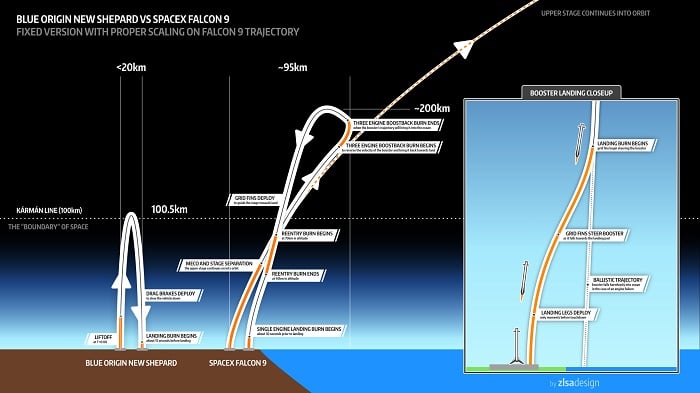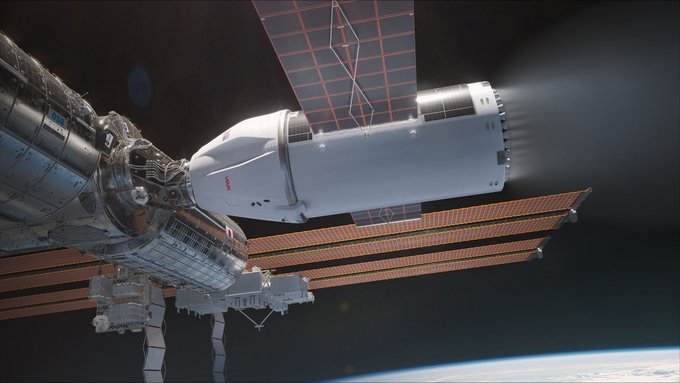New Mars Forums
You are not logged in.
- Topics: Active | Unanswered
Announcement
#76 2019-07-20 19:01:03
- louis
- Member
- From: UK
- Registered: 2008-03-24
- Posts: 7,208
Re: Space X - another successful mission...
Latest update from Cloudlicker - very interesting...
Looks like we are close to the Starhopper hover test. ![]()
Let's Go to Mars...Google on: Fast Track to Mars blogspot.com
Offline
Like button can go here
#77 2019-07-21 08:53:03
- GW Johnson
- Member
- From: McGregor, Texas USA
- Registered: 2011-12-04
- Posts: 6,066
- Website
Re: Space X - another successful mission...
Spacex's own website now has an update on the crew Dragon explosion. It pretty well matches the other recent news stories.
Looks like a titanium check valve on the Super Draco portion of the system (separate from the Draco attitude thrusters) between the helium pressurant and the NTO oxidizer leaked NTO into the helium side. Upon sudden pressurization, conditions were energetic enough to cause ignition between the titantium and the NTO, bursting the valve and causing the explosion.
The check valve is being replaced with a burst disc, which cannot leak until pressurized to burst.
Be aware that a burst disc is a one-shot device. This means the Super Draco thrusters can only be ignited once. In turn that means the Super Dracos can never be used for a powered landing that requires more than one burn. No one is talking about that.
GW
GW Johnson
McGregor, Texas
"There is nothing as expensive as a dead crew, especially one dead from a bad management decision"
Offline
Like button can go here
#78 2019-07-21 09:14:30
- SpaceNut
- Administrator
- From: New Hampshire
- Registered: 2004-07-22
- Posts: 29,707
Re: Space X - another successful mission...
Well that is bad as that puts retro propulsion use out of the question....
Time for a redesign....
Offline
Like button can go here
#79 2019-07-25 19:35:12
- SpaceNut
- Administrator
- From: New Hampshire
- Registered: 2004-07-22
- Posts: 29,707
Re: Space X - another successful mission...
SpaceX’s latest resupply launch to the ISS was a success against the odds
The rocket conveyed SpaceX’s Dragon capsule, decorated with an “Apollo 50th” badge. The capsule contained 5,500 pounds worth of equipment for experiments and ongoing scientific research. The Falcon 9 booster got the Dragon into orbit before making it back down to the Earth and landing exactly where it was supposed to about eight minutes after the launch. This is one of the last cargo resupply missions SpaceX launched under its current initial resupply contract with NASA. The contract covered 20 cargo resupply missions to the ISS, of which this was the 18th. The last two under contract will also fly Dragon capsules.

Offline
Like button can go here
#80 2019-08-01 14:08:34
- louis
- Member
- From: UK
- Registered: 2008-03-24
- Posts: 7,208
Re: Space X - another successful mission...
Brilliant four way split showing First Stage Falcon 9 landing. Very impressive!
Let's Go to Mars...Google on: Fast Track to Mars blogspot.com
Offline
Like button can go here
#81 2020-07-22 18:44:54
- tahanson43206
- Moderator
- Registered: 2018-04-27
- Posts: 22,804
Re: Space X - another successful mission...
The link below is said to show successful catch of both fairings in the most recent SpaceX launch.
(th)
Offline
Like button can go here
#82 2020-07-22 20:26:06
- Void
- Member
- Registered: 2011-12-29
- Posts: 8,908
Re: Space X - another successful mission...
Very Skillful.
Still, I am a pest. I have wondered why they just don't use a U.A.V. with grabber jaws (Rubbery), to fly out to it bite it and fly it home on a it's own lifting capability of the fairing itself (Not sure it has such), and it's gliding parachute.
The U.A.V would be air breathing.
If they really go good at it they might do similar for other packages dropped from orbit.
This would likely be a aircraft with an airbreathing, Hydrocarbon fuel engine. They could fly it to the net, or maybe even just fly it to a spaceport. (That's a longer haul).
Have I missed a problem with that?
Done.
Is it possible that the root of political science claims is to produce white collar jobs for people who paid for an education and do not want a real job?
Offline
Like button can go here
#83 2020-08-18 17:46:08
- SpaceNut
- Administrator
- From: New Hampshire
- Registered: 2004-07-22
- Posts: 29,707
Re: Space X - another successful mission...
Reuse and reduce costs is not just a moto to save the earth its a business plan. SpaceX pushes reusing rockets further with record sixth landing of a single booster
The booster's sixth successful landing pushed SpaceX's record to 58 first stage recoveries, 39 on drone ships.
https://en.wikipedia.org/wiki/List_of_F … e_boosters
Offline
Like button can go here
#84 2024-05-26 05:51:26
- Mars_B4_Moon
- Member
- Registered: 2006-03-23
- Posts: 9,776
Re: Space X - another successful mission...
SpaceX targeting next test flight of Starship megarocket
Offline
Like button can go here
#85 2024-06-15 13:53:31
- SpaceNut
- Administrator
- From: New Hampshire
- Registered: 2004-07-22
- Posts: 29,707
Re: Space X - another successful mission...
Space x Falcon 9 flight path images.





Offline
Like button can go here
#86 2024-07-12 08:51:03
- GW Johnson
- Member
- From: McGregor, Texas USA
- Registered: 2011-12-04
- Posts: 6,066
- Website
Re: Space X - another successful mission...
The last Starlink launch on a Falcon-9 had a second-stage problem. It blew up its engine trying to ignite for the second burn that raises orbit perigee. The stage itself survived this, and they deployed the satellites. However, if the satellite ion thrusters cannot keep up with drag at too low a perigee, they may fall back and enter.
A photo taken by a camera on the stage shows a very unusual and heavy ice accumulation near the plumbing at the engine power head, shedding big chunks of ice. Whatever the problem was, somehow that ice is very likely related to it.
GW
GW Johnson
McGregor, Texas
"There is nothing as expensive as a dead crew, especially one dead from a bad management decision"
Offline
Like button can go here
#87 2024-07-12 09:15:03
- tahanson43206
- Moderator
- Registered: 2018-04-27
- Posts: 22,804
Re: Space X - another successful mission...
For all ... please post any follow up reports you might find. The Falcon 9 flights have become so routine, this anomaly is quite surprising. Hurricane Beryl is the only unusual event that might have impacted the launch, but how water would have gotten inside the second stage is a mystery.
(th)
Offline
Like button can go here
#88 2024-07-17 21:32:38
- Void
- Member
- Registered: 2011-12-29
- Posts: 8,908
Re: Space X - another successful mission...
This could be moved or removed per the desires of higher powers: https://www.msn.com/en-us/news/technolo … 1be6&ei=89
Quote:
SpaceX is building a superpowered spaceship to scrap the International Space Station for NASA
Story by mmcfalljohnsen@businessinsider.com (Morgan McFall-Johnsen,Jessica Orwig) • 3h • 3 min read
Image Quote:
Well, my question is what else could you do with a "Super Dragon" assembly like that?
Keeping in mind that Starship might be able to carry it up in its cargo compartment, (Or down), and that the Starship system could also refill it in orbit.
I know that the Merlin Engines "Coke" up, but still the vehicle is made light unlike Starships Stainless Steel. (Not knocking SS for Superheavy or Starship).
But if you could get it up to LEO in a Starship system, you might have an interesting new animal in space that may have a special set of abilities.
And if not on Starship, then apparently, they can send this hardware up fully filled, presumably on a Falcon Heavy.
Well, it excites me.
Done
Last edited by Void (2024-07-17 21:41:08)
Is it possible that the root of political science claims is to produce white collar jobs for people who paid for an education and do not want a real job?
Offline
Like button can go here
#89 2024-07-29 08:53:02
- GW Johnson
- Member
- From: McGregor, Texas USA
- Registered: 2011-12-04
- Posts: 6,066
- Website
Re: Space X - another successful mission...
If this souped-up Dragon could be launched by Falcon-Heavy, then it provides a way to use an existing rocket to send a manned capsule to low lunar orbit and back. Something SLS/Orion cannot do. Just substitute a crewed Dragon for the cargo Dragon, and use the same oversize service module. Add a small lander, and you could quickly reprise Apollo.
GW
GW Johnson
McGregor, Texas
"There is nothing as expensive as a dead crew, especially one dead from a bad management decision"
Offline
Like button can go here
#90 2024-07-29 09:58:25
- Void
- Member
- Registered: 2011-12-29
- Posts: 8,908
Re: Space X - another successful mission...
It looks like a nice thing to have. If the small landers used that fuel, what is the residual toxic danger on the landing places, presuming someday humans might visit the places?
Done
Is it possible that the root of political science claims is to produce white collar jobs for people who paid for an education and do not want a real job?
Offline
Like button can go here
#91 2024-07-30 09:49:41
- GW Johnson
- Member
- From: McGregor, Texas USA
- Registered: 2011-12-04
- Posts: 6,066
- Website
Re: Space X - another successful mission...
Void:
It's the same NTO and any-hydrazine propellants used in the old Apollo LM. Most of it comes out as combustion product gases to begin with, of which ammonia is the most toxic. Any unburnt, unevaporated liquids will evaporate rather quickly in the vacuum, whenever sunlit. I suppose some traces might get into the lunar regolith, but there would be very, very little. Probably not much of threat, especially to inherently-suited people.
Just best guesses on my my part.
GW
Last edited by GW Johnson (2024-07-30 09:51:20)
GW Johnson
McGregor, Texas
"There is nothing as expensive as a dead crew, especially one dead from a bad management decision"
Offline
Like button can go here
#92 2024-07-30 10:23:05
- Void
- Member
- Registered: 2011-12-29
- Posts: 8,908
Re: Space X - another successful mission...
Thank You for your consideration of my request. The device type has some merit for continued used beyond deorbit of a space station then.
I remember long ago some articles that suggested that a person in a spacesuit with such contamination could not be allowed back into a spaceship as it would be lethal to everyone. It seems that that was very much overhyped by some reporting entity.
Your clarification then has been very helpful to me.
Done
Last edited by Void (2024-07-30 10:32:29)
Is it possible that the root of political science claims is to produce white collar jobs for people who paid for an education and do not want a real job?
Offline
Like button can go here
#93 2024-07-30 14:34:46
- GW Johnson
- Member
- From: McGregor, Texas USA
- Registered: 2011-12-04
- Posts: 6,066
- Website
Re: Space X - another successful mission...
The suit contamination risk depends upon how much, and how long it has been exposed to vacuum. Gases would not be much of a problem, only liquids on the suit surface, which may be porous. And they evaporate quickly in vacuum when exposed to sunlight.
GW
GW Johnson
McGregor, Texas
"There is nothing as expensive as a dead crew, especially one dead from a bad management decision"
Offline
Like button can go here
#94 2024-07-30 18:41:53
- Void
- Member
- Registered: 2011-12-29
- Posts: 8,908
Re: Space X - another successful mission...
Thank you again Dr. Johnson.
Can we consider what inverse staged drop tanks could do to possibly increase capability?
Quote:
This could be moved or removed per the desires of higher powers: https://www.msn.com/en-us/news/technolo … 1be6&ei=89
Quote:
SpaceX is building a superpowered spaceship to scrap the International Space Station for NASA
Story by mmcfalljohnsen@businessinsider.com (Morgan McFall-Johnsen,Jessica Orwig) • 3h • 3 min readImage Quote:
So, you put several drop tanks in series above the depicted engine section. This could be awkward as then the drop tanks are between the cargo, and the engine compartment, but Apollo did some gymnastics with the Command Module/Capsule, and the LEM.
We could never stage this way going to LEO from the Earth's surface, as (Several things), it was impractical. But once in LEO and for many operations in space, I think that inverse staging might be OK, if a bit troublesome.
As you have indicated Falcon Heavy could lift sections including drop tanks. But then Starship could do this as well.
Going out to a target you would do a burn and drop a tank. And then you get to Lunar Orbit. Then you can leave full Drop tanks in orbit and land the engine section with cargo of some type. Perform some tasks, and then come back up and hook back up to your drop tank stack and head back to Earth.
The capsule can then do the Aerobrake and Parachute action to get it down to earth, and you would have a choice of burning fuel if you had it to get the engine section into an Earth orbit. Or you could sacrifice the engine section.
If you saved the engine section you might bring it down in Starship for refurbishment, or perhaps you would be able to put more drop tanks on it and then a new cargo.
Does this have flaws that I don't understand?
Done
Last edited by Void (2024-07-30 18:56:40)
Is it possible that the root of political science claims is to produce white collar jobs for people who paid for an education and do not want a real job?
Offline
Like button can go here
#95 2024-07-31 07:41:30
- GW Johnson
- Member
- From: McGregor, Texas USA
- Registered: 2011-12-04
- Posts: 6,066
- Website
Re: Space X - another successful mission...
Void:
I don't know what the terminology "inverse staging" means.
GW
GW Johnson
McGregor, Texas
"There is nothing as expensive as a dead crew, especially one dead from a bad management decision"
Offline
Like button can go here
#96 2024-07-31 09:30:28
- Void
- Member
- Registered: 2011-12-29
- Posts: 8,908
Re: Space X - another successful mission...

This would not be limited to tanks 1-5 but could have many more. They are more or less drop tanks, if it is desired to drop them.
However, they can be retrained if desired.
Done
The tanks might be lifted to LEO by Falcon 9 or Falcon Heavy, or Starship. They might be lifted filled or not, if not then the stack might be filled prior to launch from LEO to the Moon.
Looking for advice on improvements or flaws I have not understood.
Done
Landing Basket B is for Cargo. Cargo would need reasonable balancing by Propper distribution in the Landing Basket.
Done
Last edited by Void (2024-07-31 10:52:31)
Is it possible that the root of political science claims is to produce white collar jobs for people who paid for an education and do not want a real job?
Offline
Like button can go here
#97 2024-08-01 09:14:04
- GW Johnson
- Member
- From: McGregor, Texas USA
- Registered: 2011-12-04
- Posts: 6,066
- Website
Re: Space X - another successful mission...
Void:
Ah, now I understand. Thanks.
This is an old idea. If you have engines capable of many burns reliably, it makes very good sense. In the early days, we did not have engines that could even be re-started once, which is why this idea was not used long ago. That has changed very much in recent years.
The way around having to disconnect and reconnect the stack in order to discard empty tanks is also very old: cluster them in parallel and not series. Eject them straight out to the side. Just like the drop tanks off an airplane. This works very easily for something assembled by docking, in low Earth orbit.
In point of fact, this very staging technique was proposed in the Walt Disney 1958-ish flick about going to the moon.
GW
GW Johnson
McGregor, Texas
"There is nothing as expensive as a dead crew, especially one dead from a bad management decision"
Offline
Like button can go here
#98 2024-08-01 11:12:18
- Void
- Member
- Registered: 2011-12-29
- Posts: 8,908
Re: Space X - another successful mission...
Dr. Johnson,
Thank you could your continuation of conversation. Yes, I enjoy revisiting old ideas that would have been obviously desirable, except that the technology was in its infancy. (You referred to engine reburns).
Also showing up now, I believe it the moving of propellant fill from one tank to another, which was not so much a thing at that time, I believe.
Yes, the parallel method makes plenty of sense for drop tanks. Serial is a problem if the capsule is there. But I think that the option to place the capsule as attached to the landing basket reduces that trouble on the trop out to the Moon. But as is always likely a new trouble is created of an unbalanced load. So, load balancing and the ability to offset thrust for steering are required.
Upon Lunar Orbit the sample return capsule can be left in orbit of the Moon with refill tanks, (Depot).
Of course, I am thinking a robotic mission, so we are not playing with people's lives directly.
Eventually, if they system tested out well with robotics perhaps it might be upgraded for humans.
I like the HLS Starship, but it is overkill once insitu creation of goods can be done on the Moon. It may continue as useful for large amounts of passengers Earth<>Moon, but that is if it is decided that a large population on the Moon is a good thing.
It may be that for some time the Moon will be handled like Antarctica, with small human presence. In that case a Stainless-Steel Starship is not going to make a lot of sense. Better the lighter alloys if you are not going to aerobrake a Starship. It may be fine for a singular base on the Moon, but if you want to do geology in various places, I think it may not be the thing to want.
But as a one-way ship to build up bases once you find a resource, Starship would continue to be a wonderful device.
That is my opinion for now.
Done
But the current notion of HLS Starship as a research effort makes sense now, as it will help to prove the Starship for the rigors that going to Mars will hold. And NASA needs a lander.
Done
Last edited by Void (2024-08-01 11:26:31)
Is it possible that the root of political science claims is to produce white collar jobs for people who paid for an education and do not want a real job?
Offline
Like button can go here
#99 2024-08-01 14:51:14
- tahanson43206
- Moderator
- Registered: 2018-04-27
- Posts: 22,804
Re: Space X - another successful mission...
For Void ...
But the current notion of HLS Starship as a research effort makes sense now, as it will help to prove the Starship for the rigors that going to Mars will hold. And NASA needs a lander.
Dr. Johnson has designed a lander, and in addition to numerous documents, he has produced a YouTube video about it. Would you like to receive links to these materials?
(th)
Offline
Like button can go here
#100 2024-08-01 15:18:38
- GW Johnson
- Member
- From: McGregor, Texas USA
- Registered: 2011-12-04
- Posts: 6,066
- Website
Re: Space X - another successful mission...
Void:
I'm still thinking about your "reverse staging" notion for some sort of 1-way lunar cargo transport. I really like the idea of using some sort of cargo "doughnut" as the landing "legs", to be left on the moon. I'm not at all sure we need to do lunar orbit rendezvous, it may actually be easier and more practical to just bite the bullet and fly direct from LEO to the lunar surface, and back to LEO.
If you make the propellant drop tanks long and thin, there is a small cluster that could return the core from the moon to LEO. Around that you add a layer or two to supply the propellants for a direct landing of the core and cargo. Around that is another layer or two that supplies the propellant to depart LEO fully assembled.
The LEO departure tanks could conceivably be returned to LEO by some sort of tug, from circulating on the transfer orbit to and from the moon. The lunar landing tanks would get ejected onto the lunar surface after landing, and stay there, for some other use there. The return tanks would definitely get returned to LEO, where they could be refilled and re-used.
The core is the engine set, a module with guidance and control equipment plus the power to run it, and the return tanks, plus an optional capsule if a crewed mission. As assembled in LEO, it would be that core covered laterally by layers of drop tanks comprising the landing set and the LEO departure set. Such tanks could be sent up pre-loaded to LEO in clusters by something large but economical like Starship/Superheavy. Definitely NOT SLS!
The cargo "doughnut" that doubles as "landing legs" is actually the most difficult concept. It cannot be a real circular doughnut shape, or it cannot easily be sent up to LEO. But it could be straight cylindrical segments with angled docking mounts, that could be assembled into a large segmented "ring" by docking modules together on orbit. These things could actually somewhat resemble shipping containers. The durability of such a thing makes it usable as "landing legs".
The thing to remember about landing legs is that the span of the pattern needs to equal or exceed the height of the center-of-gravity of the landing vehicle. That is where laterally-ejected drop tanks really "shines"! Starship/Superheavy is inherently unstable on rough ground, anywhere, precisely because it is tall and thin.
All in all, I kinda like your concept. For the moon. Mars is a different problem.
GW
Last edited by GW Johnson (2024-08-01 15:23:52)
GW Johnson
McGregor, Texas
"There is nothing as expensive as a dead crew, especially one dead from a bad management decision"
Offline
Like button can go here

